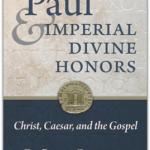David Martin’s Christian Language and Its Mutations: Essays in Sociological Understanding has some good moments. The big problem first: He seems to assume that sacred and secular are divided by a given (though fluid) boundary, and thus argues that Christianity must “adjust to” and “compromise with” the languages and mores of the secular world. But Christianity must so adjust itself only if we assume that the secular is already THERE, and that it’s fundamentally impenetrable to Christian truth. And this, as Milbank, Hauerwas, and others have argued, is just a way of fixing modern social and political arrangements as if they were written into the fabric of the universe, another way of “policing” and protecting the secularity of the secular.
Given that big caveat, however, Martin is a pungent writer and keen observer, with a lot of interesting things to say about how Christian language is transformed by context. His discussion of church music is particularly provocative, contrasting the view that church music is the “sonic” dimension of prayer (a notion he picks up from Orthodox thinkers) with the “demotic” view that music mainly serves an evangelistic function, and the various compromises between these two views that have characterized much of church history. Martin is also Catholic in the best sense, paying close attention to what is happening in evangelicalism, even on the fringes of that fringe.















